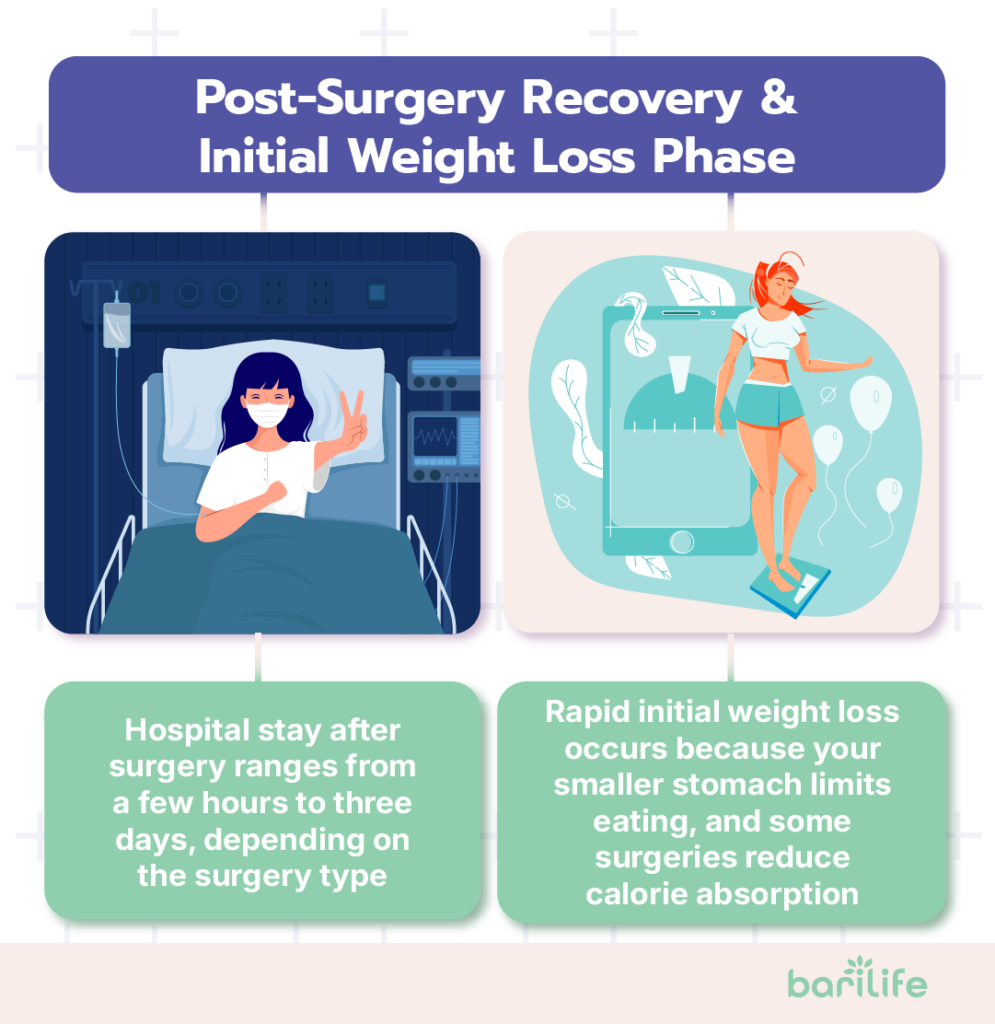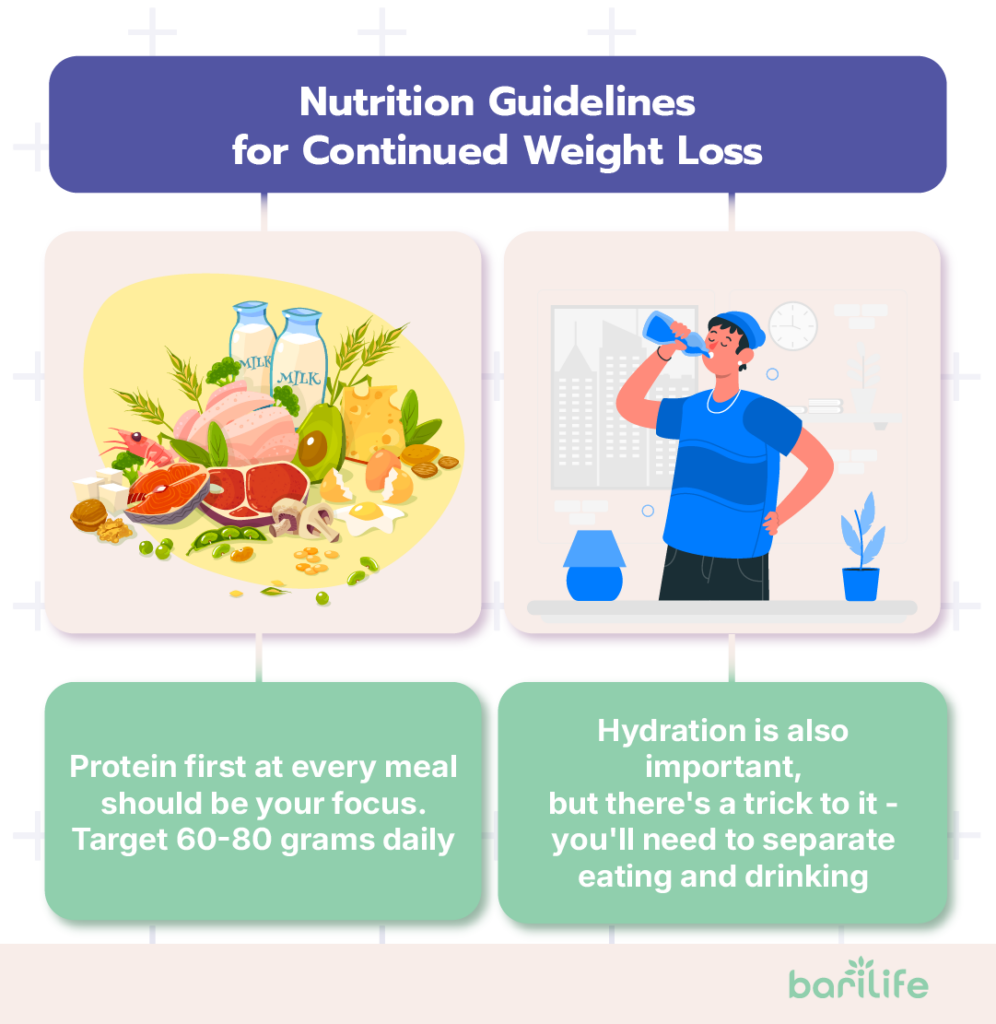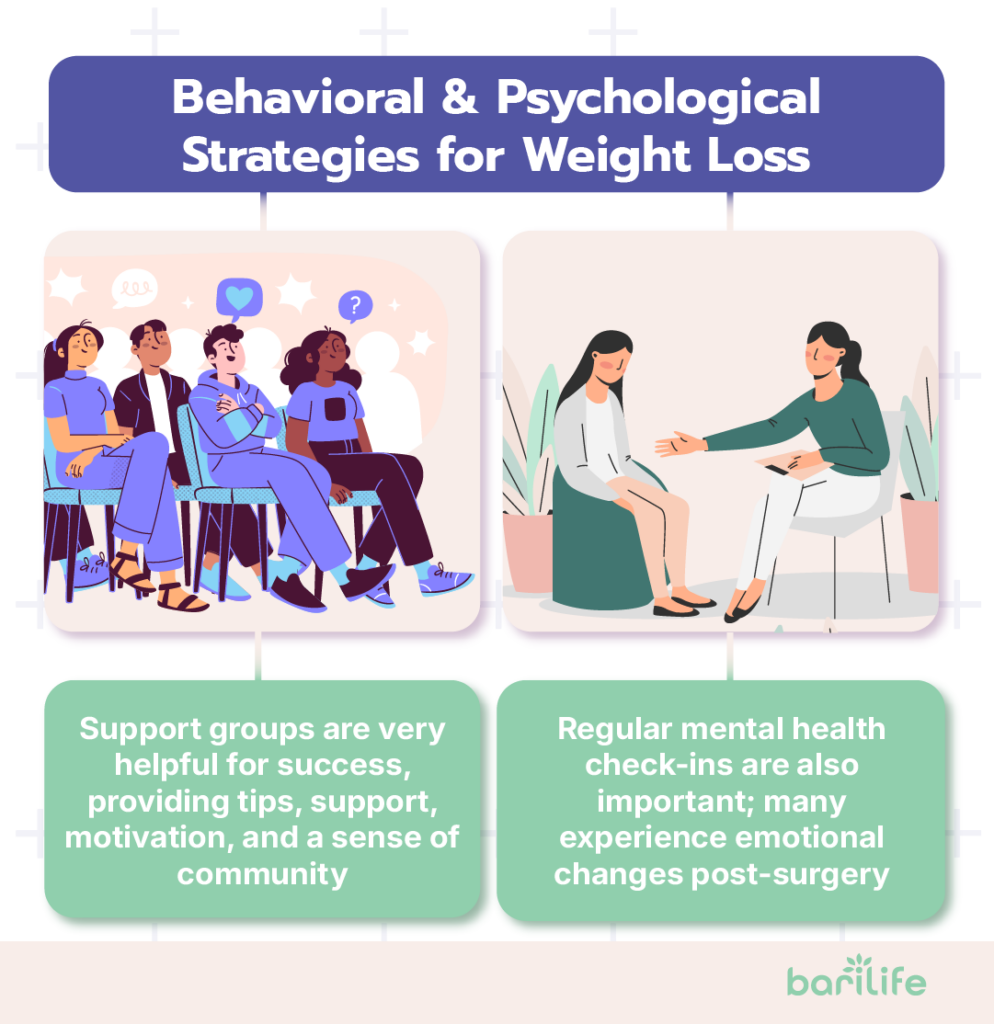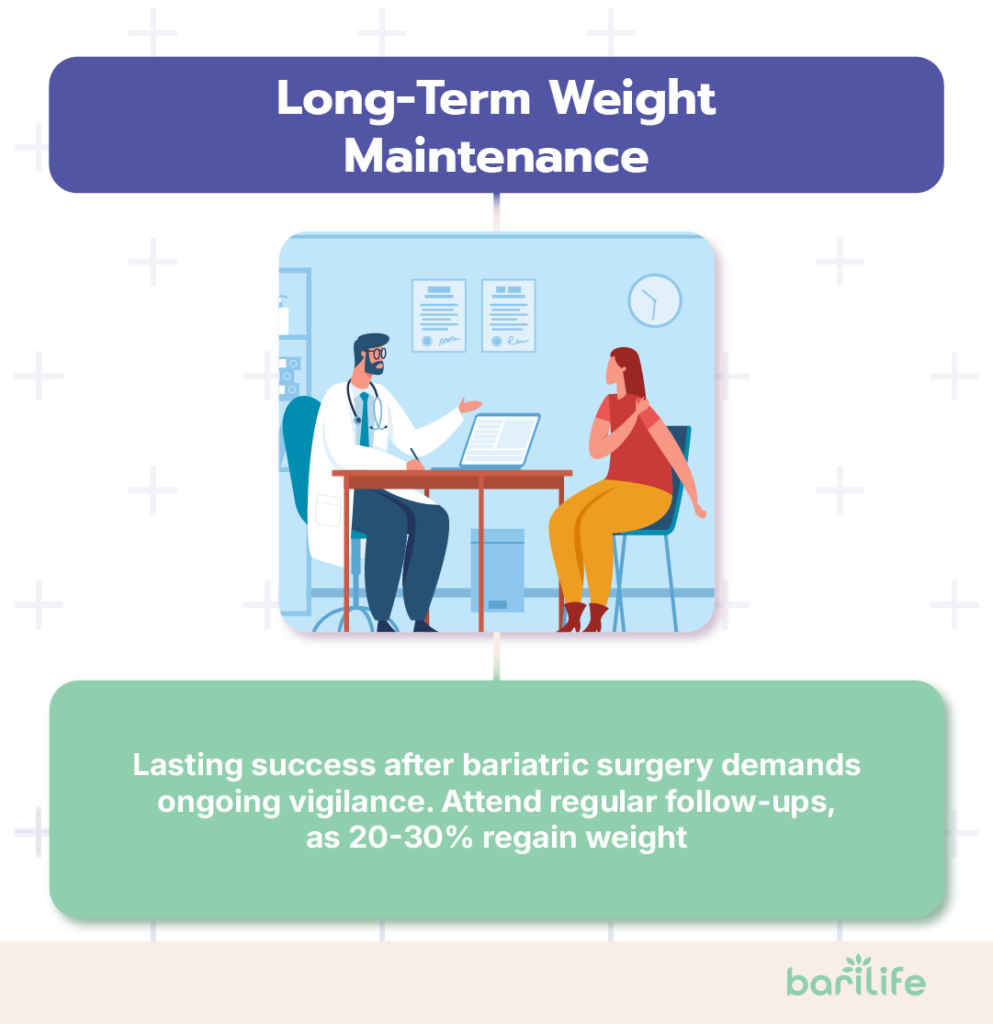Key Takeaways:
- It is important to follow the proper dietary progression after surgery—start with clear liquids and gradually transition to solid foods, prioritizing protein.
- Exercise such as cardio and strength training can maximize weight loss and prevent muscle loss.
- Support groups and behavioral strategies are just as important as diet and exercise for achieving long-term weight loss success.
Many people think that bariatric weight loss surgery alone will solve their weight problems, but the reality is more complex. Your daily choices and habits after surgery will ultimately determine how much weight can you lose with bariatric surgery and whether you maintain those results long-term.
The first year after surgery offers the best opportunity for significant weight loss, but knowing exactly what to do during this critical window can be confusing. Let’s explore the proven strategies for safely and effectively losing weight after bariatric surgery.
Table of Contents
Post-Surgery Recovery & Initial Weight Loss Phase

Your weight loss journey begins immediately after surgery, but this early phase requires careful attention to your body’s healing process.
After your surgery, you’ll need to stay at the hospital anywhere from a few hours (for outpatient procedures) to about three days, depending on which type of surgery you had. Full recovery takes longer—from several weeks to several months—with laparoscopic procedures generally having shorter recovery times than open surgeries.
During these early weeks, your diet will progress through several stages:
- Clear liquids—water, broth, sugar-free gelatin
- Full liquids—protein shakes, yogurt without chunks
- Pureed foods—the consistency of baby food)
- Soft foods—well-cooked vegetables, ground meat
- Regular foods—with new eating habits
This progression is designed to help you adjust to your new stomach size and develop healthy eating habits that will support your weight loss in the long term.
Many people lose weight rapidly during this initial phase. This happens because your smaller stomach limits how much you can eat, and some procedures also reduce how many calories your body absorbs. This phase is often when you’ll notice how fast do you lose weight after bariatric surgery—typically quite rapidly in the first few months.
Even while you’re recovering, gentle movement is important. Walking is usually recommended within hours after surgery to prevent blood clots and help with gas pain. As you heal, you’ll gradually increase your activity level under your doctor’s guidance.
Nutrition Guidelines for Continued Weight Loss
After the initial recovery phase, proper nutrition becomes your most powerful tool for continued weight loss.
Protein should be your top priority at every meal. Aim for 60-80 grams daily, eating the protein portion of your meal first. This helps preserve muscle mass during rapid weight loss and keeps you feeling full longer.
Hydration is also important, but there’s a trick to it – you’ll need to separate eating and drinking. Typically, you are not allowed to drink anything 30 minutes before meals, during meals, or 30 minutes after meals. This prevents overfilling your stomach pouch with water and not nutrition.

Your doctor will guide you on how much water you need daily.
Vitamin and mineral supplements will be a requirement after surgery. Your modified digestive system can’t absorb nutrients as efficiently, putting you at risk for serious deficiencies. You’ll need to take specific supplements for life, including:
- Multivitamin
- Calcium with vitamin D
- Vitamin B12
- Iron (for some people)
Exercise & Physical Activity
If you’re curious about how to lose weight fast after bariatric surgery, adding regular exercise to your routine is key.
Ideally, you would have started some physical activity before surgery, but it’s never too late to start—even small amounts of movement matter. Walking is perfect, as it’s gentle on your joints but effective for weight loss.
As you get stronger, aim for 150 minutes of moderate-intensity exercise each week (30 minutes, 5 days a week). This could include:
- Brisk walking
- Swimming
- Cycling
- Dance classes
- Elliptical training
Strength training is equally important, though often overlooked. Lifting weights or performing bodyweight exercises two to three times a week helps preserve muscle mass, strengthen bones, and boost your metabolism. However, be sure to get clearance from your doctor before starting strength training.
Behavioral & Psychological Strategies for Weight Loss
The mental and emotional sides of weight loss after bariatric surgery are just as important as diet and exercise.
Support groups can make a big difference in your success. Research shows that people who regularly attend support groups lose more weight than those who don’t.
These groups provide:
- Practical tips from others on the same journey
- Emotional support during challenges
- Accountability and motivation
- A sense of community and understanding
Many hospitals and bariatric programs offer in-person or online support groups specifically for bariatric patients.
Behavioral therapy techniques can help you establish new habits and overcome old patterns. Useful strategies include:

- Keeping a food and exercise journal
- Setting specific, achievable goals
- Planning meals ahead of time
- Identifying emotional eating triggers
- Developing other coping mechanisms for stress or emotions that don’t involve food
Regular mental health check-ins are important, too. Many people experience emotional changes after surgery, from “head hunger” (wanting to eat when you’re not physically hungry) to body image adjustments as your appearance changes rapidly. Some people even experience “transfer addiction,” where food addiction shifts to another potentially problematic behavior.
Working with a therapist familiar with bariatric issues can help you deal with these challenges and create healthy coping strategies that don’t interfere with your weight loss goals.
Managing Weight Loss Plateaus
Almost everyone who has bariatric surgery will experience weight loss plateaus—periods where the scale doesn’t move despite your best efforts. When you hit a plateau, first reassess your diet. Common issues include:
- Portion sizes are gradually increasing (known as “portion creep”)
- Grazing throughout the day instead of eating structured meals
- Consuming liquid calories (juice, alcohol, sweetened coffee drinks)
- Not getting enough protein
- Eating too many processed carbohydrates
Sometimes, simply returning to the basics of your post-surgery diet can restart weight loss.
Changing up your exercise routine also helps break through plateaus. Your body adapts to regular activities, so trying new workouts, increasing intensity, or adding interval training can challenge your body in new ways.
If your plateau persists for more than a month despite these changes, it’s time to consult your healthcare team. They might:
- Check for medical issues that could be affecting your weight loss
- Review your medications
- Assess your nutritional status
- Help you develop a revised plan
Remember, plateaus are a normal part of the journey when reaching the average weight loss after bariatric surgery, and they are temporary. With persistence and the right adjustments, you can conquer them and resume progress.
Long-Term Weight Maintenance

Long-term success after bariatric surgery requires ongoing commitment and vigilance. About 20-30% of people regain significant weight within a few years of surgery, so you’ll need to attend follow-up appointments regularly. Plan to see your bariatric team at least annually for life. These visits allow them to:
- Monitor your weight and overall health
- Check for nutritional deficiencies
- Address any complications early
- Adjust your plan as needed
If you notice the scale creeping up, take action immediately instead of waiting until you’ve regained significant weight. It’s much easier to address a 5-pound gain than a 50-pound one.
Conclusion
Successful weight loss after bariatric surgery requires a comprehensive approach that includes proper nutrition, regular physical activity, psychological support, and lifelong follow-up care.
The surgery gives you a powerful tool, but how you use that tool determines your long-term success.
By following the expert tips we’ve outlined in this article, you can make the most of your weight loss, improve your health, and transform your life. Life after bariatric surgery is a marathon, not a sprint—focus on progress, not perfection, and celebrate every victory along the way.
How Bari Life Can Help
Bari Life products are developed by bariatric specialists who understand exactly what your body needs after surgery. Our bariatric vitamins are designed to help prevent nutritional deficiencies, ensuring you stay healthy throughout your weight loss journey. Whether you’re looking for bariatric multivitamins to cover your daily needs or bariatric vitamins chewable for easier intake, we have options tailored just for you.
To support your continued weight loss and meet your protein needs, we offer delicious bariatric protein shakes and bariatric protein bars. These high-quality protein options are perfect for maintaining muscle mass and keeping you feeling full between meals.
In addition to core supplements, Bari Life provides a variety of bariatric snacks that fit perfectly into your post-surgery lifestyle. We also carry bariatric calcium chews to support your bone health and a bariatric multivitamin with iron to ensure you meet all your essential nutrient requirements.
For those who prefer a different format, our liquid bariatric vitamin is a convenient and effective alternative. We also understand the importance of gut health, which is why we offer a specialized bariatric probiotic to support digestive wellness.
If you’re concerned about maintaining your hair health during rapid weight loss, Bari Life also offers bariatric vitamins for hair loss, specifically formulated to strengthen hair and prevent thinning.
Visit Bari Life today to discover how our specialized bariatric supplements and more—can help you reach your weight loss goals and maintain your success for years to come!
Resources
4 Steps to Stay Hydrated After Bariatric Surgery. (2018). Penn Medicine.
Adult Activity: An Overview. (2023). CDC.
Changes After Bariatric Surgery. (N.D.) Nationwide Childrens.



What are your tips and tricks to post-bariatric success?